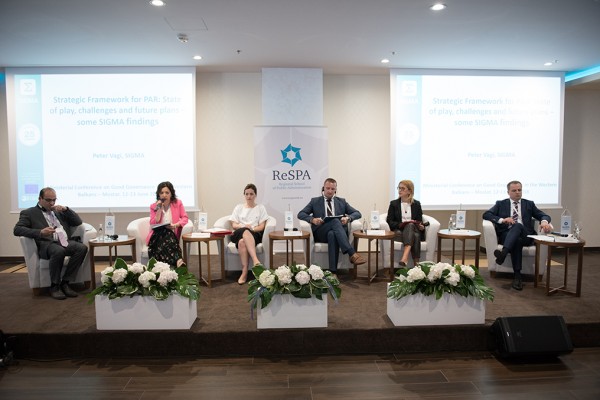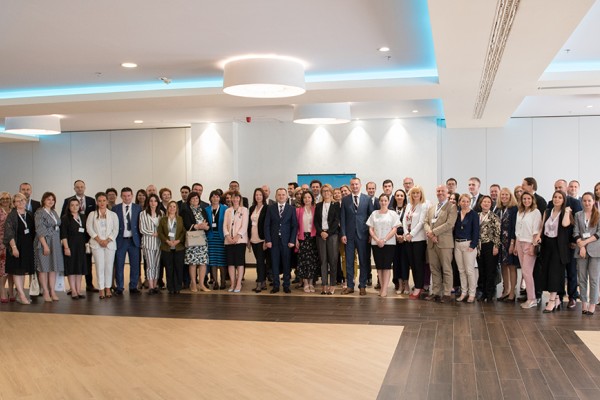
Ministerial Conference: Good Governance in the Western Balkans
Mostar, 12-13 June 2018 - For the purpose of further strengthening of policy dialogue on public administration reform (PAR) as one of key priorities in the enlargement process, a two-day regional conference entitled „Good Governance in the Western Balkans“ was held in Mostar, organised by the Regional School of Public Administration (ReSPA) in cooperation with the Ministry of Justice of Bosnia and Herzegovina.
The conference brought together 80 participants: ministers in charge of public administration; representatives of ministries of finances; national IPA Coordinators of the Western Balkans; high level representatives of state administrations dealing with PAR, Public Finance Management and European integration; representatives of the European Commission (Directorate-General for Neighbourhood and Enlargement Negotiations - DG NEAR and European Union Delegation to BiH); OECD/SIGMA ;Regional Cooperation Council (RCC),Regional Anti-Corruption Initiative (RAI), Centre for Security Cooperation (RACVIAC); international organisations, CSOs and other partners.
The issue of good governance is a requirement of public administration reform which, together with the rule of law and economic governance, remains a key reform and strategic priority in the Western Balkans. In this context, major themes discussed at the conference were related to the strategic framework for PAR and its financial sustainability, quality of policy planning and coordination, and monitoring and reporting on implementation of PAR strategies and adequate EU financial assistance for supporting reforms.
In the almost eight years of its existence, the primary goal of ReSPA has been helping governments in the region build stronger administrative capacities for successful implementation of the requirements related to the EU accession process and for development of modern, professional and competent public service.
At the opening of the regional conference, Ms. Ratka Sekulović, Director of ReSPA, said that although significant progress has been made over years, the Western Balkans region is still facing important challenges regarding public governance. “While all of ReSPA Members have new Public Administration Reform strategies (except for BiH), the strategic plans do not always transpose the reform in all its complexity. There is a particular need for further enhancement of capacities for implementation and monitoring. The transposition of the principles of good governance into everyday practice of our administrations is fundamentally important for the success of political and economic reforms and building a basis for implementing EU rules and standards,” Ms. Sekulović pointed out.
In a desire to fasten up reform activities, it is often ignored that the implementation requires people - civil servants with adequate expertise and knowledge in the areas of strategic planning, drafting the impact of regulations and policies, public consultations, interinstitutional consultations and coordination. “It is precisely these highly skilled and knowledgeable civil servants who make a basis for implementing reform efforts; and all the countries of the region, including Bosnia and Herzegovina, have for years been struggling with the problem of inadequate human capacity and the potential for the implementation of substantive reforms,” said Mr. Josip Grubeša, Minister of Justice of Bosnia and Herzegovina, Chair of the ReSPA Governing Board at Ministerial level.
“It is clear that the reform processes also require great financial resources, and we are aware that no country in the region has unlimited funds available. This is why we need to focus on financial planning and the management of public finances, because if we plan well, then we will have an adequate basis for providing EU and other donor funds, to support the implementation of reform activities,” Minister Grubeša underlined.
Mr. Khaldoun Sinno, Deputy Head of the Delegation of the European Union to Bosnia and Herzegovina emphasized that the EU has a strong belief that regional cooperation contributes to building a sustained long-term response to the challenges in the Western Balkans. “Strong governance and effective public administrations are the key for tackling all these regional priorities and addressing your reform priorities throughout your respective EU integration paths. There is also a strong link between economic development and growth and quality of governance,” said Mr. Sinno.
Summarising the European Commission’s findings in the 2018 enlargement package adopted in April, Mr. Sinno said that the Western Balkans is clearly on the right track, but a lot of challenges are still ahead. “It is clear that our 'Fundamentals first' approach will only deliver the desired results if countries are seriously committed to a comprehensive, ambitious and credible agenda of domestic reforms. Continuous political commitment, strong inter-institutional coordination and increased transparency and engagement of external stakeholders are therefore essential to stay on the right track,” Mr. Sinno concluded.
“Comparing good and bad experiences must take place at political and technical levels, regularly, and supported by research and training. ReSPA is the place to be for regional cooperation. EU sets important incentives through support, finance, and access. Exchange means primarily inspiration, not finding one-size-fits-all solutions. Once the Principles of Good Governance are agreed, it is all about implementation,” said Mr. Rolf Alter, the Hertie School of Governance, Berlin, in his keynote speech.
Some of the conclusions and recommendations from the conference:
- Adherence to the concept of Good Governance, in relation to the preparation and adoption of the strategic framework for the public administration reform in the Western Balkans, requires the insertion of tools and modalities enabling constant modernization of public administration and improvement of public service delivery.
- In terms of financial sustainability of public policies, the conference underlined sound and effective management of public finances as an important part of public administration reform processes, which stays one of fundamentals of the EU integration policy.
- Recognizing the importance of public scrutiny over implementation of strategies, the governments of the Western Balkans are recommended to ensure proactive publication of monitoring reports, and to enable more consistent inclusion of civil society in monitoring and reporting. Practices of inclusion of data provided by civil society in governments' monitoring reports and organisation of public debates on the implementation of the PAR and PFM strategies, initiated in some countries, should be more actively promoted across the Western Balkans as a model of good practice.
-
It has been agreed to foster the exchange of experiences among the ReSPA Members in developing ICT solutions for planning systems, with the support of different donor organisations.
- The introduction of the EU Budget Support as a
new aid modality was assessed as beneficial for improved policy coordination
and strategic planning and implementation of IPA funds




